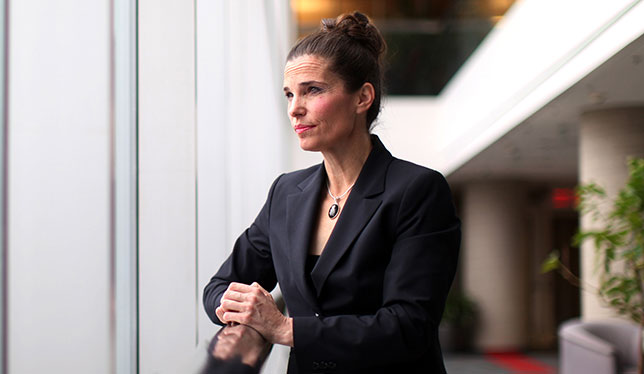“Please, call me Kirsty,” says the affable federal Minister of Science Kirsty Duncan as we sit down in her Ottawa office. Dr. Duncan, who holds a PhD in geography from the University of Edinburgh and a bachelor of geography and anthropology from the University of Toronto, was first elected the Member of Parliament for Etobicoke North in 2008 and was named to cabinet following last fall’s election. She taught meteorology, climatology and climate change at the University of Windsor, and medical geography at U of T. Dr. Duncan gained international attention for leading an expedition aimed at discovering the causal agent of the 1918 Spanish influenza virus. Her book, Hunting the 1918 Flu: One Scientist’s Search for a Killer Virus, published in 2003, details the 10-year history of that search. Dr. Duncan also contributed to the Intergovernmental Panel on Climate Change, which won a Nobel Prize for its work in 2007.

University Affairs: Dr. Duncan, I have seen it remarked in various international media how unusual, or refreshing, it is that Canada’s science minister is an actual PhD graduate. What got you interested in science?
Kirsty Duncan: It started right from that first undergraduate lecture at U of T, literally. The professor took us around the world in a two-hour lecture. He must have mentioned 30 things I had never heard of. And I was reflecting, from that minute, that my goodness this is what I want to do with my life. The goal from that day was to do research and teach in university. It was the world I loved. I loved my research. I miss my students very much but I’m always glad to hear from them and do I hear from them a lot, right back from 20 years ago.
UA: But then you left that world of academe for politics…
Dr. Duncan: It’s a hard decision to leave the world you love, but I always taught my students you have to make a difference. With my work on climate change, there was this sort of the realization that I can’t stay on the sidelines any more. I saw science being eroded. I saw science-based decision-making being eroded and decided I was running.
UA: How does your experience as a researcher inform what you do as minister of science?
Dr. Duncan: I come from that world. I understand what it takes [to succeed] as a young researcher. I was 24 when I began as a researcher. I understand what it takes to get a research program going. It’s hard work. You work seven days a week.
UA: I know that you have been keen to see more women and other underrepresented groups pursue the STEM disciplines. How might we go about achieving that?
All members of cabinet have mandate letters and they’re open for everyone to see, and that’s a good thing. The research community and government scientists can see and will be able to say, is she making progress on what she has been tasked to do?
Increasing the representation of women in STEM is a longstanding issue. And there are other underrepresented groups, for example indigenous and people with disabilities. We need to change that.
I’ve made it a goal, whenever I travel, to meet not only with researchers but also with young women. In Cape Breton, I met an incredible young student, an athlete, who loves science and she wants to become a coast guard engineer. She said everybody told her women can’t do that. It’s impossible. I told her it’s not impossible. That’s just an opinion. And it’s a dare.
We have been listening and we’re trying to work out how we can do this.
UA: I think it’s fair to say that many in the science community were unhappy with the previous federal government for various reasons that we don’t need to get into here. There was real elation in that community with the election of the new government. Expectations are high. How do you manage those expectations?
Dr. Duncan: I can’t say it enough: the war on science is over! Yes, there are high expectations. But this is the community I love. I’ve spent the past six months just listening. I’ve gone from one coast to the other and will soon be visiting the third coast.
I hope that people see what they asked for reflected in the budget, for example. We did very well in the budget: $2 billion for infrastructure [through the Post-Secondary Institutions Strategic Investment Fund], and that really will be a $4-billion investment in our universities and colleges and polytechnics through matching funding. And, we are trying to hit the ground running, which is why the closing date was May 9, so that we can take advantage of the summer construction season. We also had the largest investment in the granting councils in a decade. I was really pleased by that.
I hope that the community sees that we were listening and that we’re going to continue with that. We’re scientists, we work in collaboration and I have an open-door policy. My job is to serve you, to serve the community, and I hope they understand that we’ve got to do this as a partnership and get it right because it’s far too important.
UA: Among your many tasks as science minister will be to create the position of chief science officer. What can you tell me about that?
Dr. Duncan: We are in listening mode. The first thing we did was we wrote to all our major stakeholders and said, “We want your ideas, what should this chief science officer look like?” I talked to the chief science advisers in New Zealand, Israel, the U.K., the U.S., and in Quebec with Dr. [Rémi] Quirion. What best practices can we borrow? And, I wrote to all Parliamentarians, and I can tell you in seven-and-a-half years of being here, no one ever asked me for my ideas before now. One party does not have all the ideas.
So we’ve got all that feedback and we’ve just finished the analysis. And, I don’t use that term lightly; we did run statistics – we are after all a ministry of science. Hopefully, in the next few months, we will be able to announce the new position.
UA: The 2016 budget announced that the minister of science will undertake a comprehensive review of all elements of federal support for fundamental science over the coming year. What are you trying to achieve with this?
Dr. Duncan: That really came out of that listening piece. We heard it’s time for a review. I want to know where the gaps, the challenges, are. How can we do better by the research community? One example I’ll give you is young scientists. It’s not OK that young researchers, for CIHR for example, are getting that first grant primarily between the ages of 41 and 43.
There will be two parts to this [review], and one will be coming very soon, which is the announcement of a review panel. It will probably be six months for them to report back their findings: Where are the gaps? Where are the holes? Have we got the best systems to support researchers? What changes need to be made? That discussion will also be opened up. We’ll create a website where researchers from across the country will be able to give their feedback.
(Editor’s note: The nine-member review panel was announced on June 13. The panel is headed by David Naylor, former president of U of T. The other members are Robert Birgeneau, former chancellor of the University of California Berkeley; Martha Crago, vice-president, research, at Dalhousie University; Claudia Malacrida, associate vice-president, research, at the University of Lethbridge; Martha Piper, former president of the University of British Columbia; Quebec’s chief scientist, Dr. Quirion; Anne Wilson, a professor of psychology at Wilfrid Laurier University; Mike Lazaridis, co-founder of Research in Motion; and Nobel Prize-winning Canadian physicist Art McDonald.)
UA: Looking ahead, where would you like Canada to be in terms of research in five to 10 years?
Dr. Duncan: Well, I’ll tell you, it breaks my heart that in a 10-year period we fell from third to eighth place among OECD countries in terms of HERD [government expenditures on higher education research and development as a percentage of gross domestic product]. That should never have happened. That’s why it was so important for me to get that big investment in the granting councils.
Do we have a strong vision for science? Do we have the support of the research community? Do we have the funding systems that allow our world-class researchers to do the work they want do to? And, with the chief science officer, are we building a system where we have the evidence to inform decision-making? My job is to support research and to make sure evidence makes its way to the cabinet table.

Good start!
Now, time to enhance NSERC and CIHR funding, stop exorbitant upgrades to universities (who cares if there are fancy new bldgs or not, as long as research/ teaching are satisfactory), limit tenure (or restrict it to those under 65), increase rates of trainee funding (min. 30K/yr for grad students and 50K/yr for postdocs), give full workers’ rights to these “trainees”…… then we will call it progress.
I agree with SC.
NSERC just awarded 465 million but this is spread among 4000 awards. My NSERC budget is $31K/year – clearly insufficient. Student stipends vary between $18-28K/year. I just spent $3K on reagents to revise a manuscript that will cost >$5K to publish.
To really support STEM research and training in Canada NSERC’s budget should probably be tripled and CIHR’s budget doubled.
Comment 1: Stop funding science education with NSERC dollars. Get back to the basics. Fund only research projects. This should include fundamental based research as well.
Comment 2: Create another separate Funding Agency for funding students to work on research projects. (MSc, PhD, Post Doc, etc.) This should not be apart of the NSERC allocation. Research is expensive enough ..without also trying to fund students out of the same pot of money. Further, student employment should not be apart of the decision as to whether the research is good or not.